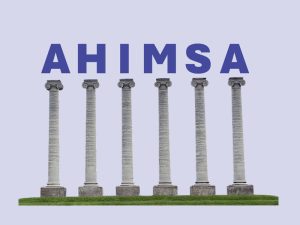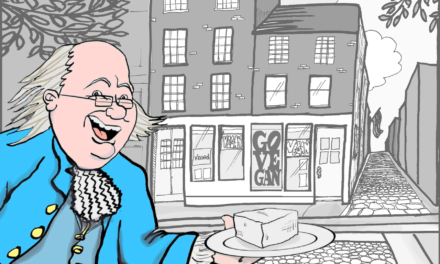Jay Dinshah first wrote “The Pillars of Ahimsa” in 1966. November 2023 marks the 90th anniversary of Jay’s birth, and today his message is still important, possibly more than ever:
 Ahimsa is the Sanskrit word for nonkilling, noninjuring, and nonharming. Far from mere passiveness, it is a positive method for meeting the dilemmas and decisions of daily life. We term it “Dynamic Harmlessness” (doing the most good and the least harm), which encourages nonviolent action to create positive changes. Ahimsa is the compassionate way of life.
Ahimsa is the Sanskrit word for nonkilling, noninjuring, and nonharming. Far from mere passiveness, it is a positive method for meeting the dilemmas and decisions of daily life. We term it “Dynamic Harmlessness” (doing the most good and the least harm), which encourages nonviolent action to create positive changes. Ahimsa is the compassionate way of life.
It was the guiding light of Mahatma Gandhi, which enabled that great soul to marshal the love force necessary to liberate his nation of some four-hundred-million people. Ahimsa was personally advocated by Dr. Albert Schweitzer, who noted that it encompasses the concept of Reverence for Life: Weighing actions to achieve the most good and least harm means making conscious choices. Extend The Golden Rule (act towards others as we would wish them to act towards us) to all animals, both human and nonhuman.
H. Jay Dinshah welcomed people to veganism, regardless of their political or religious affiliations. He taught them the compassionate philosophy of vegan living. Inspired by The Golden Rule and Reverence for Life, Jay created the backronym for AHIMSA:
Abstaining from Animal Products
This is a meaningful, positive, highly practical manifestation of the inward attitude of Kinship With All Life. It brings positive benefits to the abstainer, the animals, and the fellow humans one contacts. Look an animal in the eye and ask for the strength to start/stay on a vegan journey. Learn to enjoy the bounty of plant-sourced food.
Harmlessness with Reverence for Life
Humans, having the most power on Earth, must use that power ethically and benevolently, not mindlessly running amuck, killing and destroying, creating fear and hatred, and leaving degradation and death in their wake. This is another seemingly negative pillar with highly positive results.
Integrity of Thought, Word, & Deed
In ahimsa, we work toward the state wherein there is truth, justice, and kindness in all that we think, say, and do. We should not condone dishonesty, corruption, or hypocrisy in ourselves. We cannot do something that we know to be cruel or wrong merely because it seems expedient or profitable at the moment. This is a pillar of obviously positive values with right thinking and right speaking laying the solid foundation for right action.
Mastery over Oneself
Ahimsa guides us in transcending our egocentric, lower, rougher nature and brings forth our finer, higher self. Instead of a “me-first” attitude with materialism and selfishness, we have enlightenment and understanding. When we have mastery over pride, envy, cruelty, hatred, anger, jealousy, prejudice, fear, ignorance, consumerism, selfishness, gluttony, and greed, we find it easy to identify and clarify needs versus wants. A measure of self-control is necessary for the achievement of every other pillar.
Service to Humanity, Nature, & Creation
The path of ahimsa opens new doors to creative service, to altruistic and unselfish living, and to devoting oneself to helping make this world a better, more reasonable and harmonious place to live. Find your happiness while benefitting the Earth and its inhabitants.
Advancement of Understanding & Truth
To know something is not enough; knowledge must be understood. It should not just be swallowed but digested, assimilated, and put to good use. Furthermore, our perception of facts may change in time, as with the good old flat-Earth concept. We may not know absolute truth about all things. For practical purposes, we can apply Gandhi’s measure that truth is for each individual what one’s “small, still voice within” says in guidance, according to the individual’s respective development. We also must size it up against the eternal measure of The Golden Rule before translating our relative truth into action.
These are the basic tenets of the most effective possible path away from the violent past to a better, peaceful era for humankind. Individual or collective efforts to find the way will come to naught if inspired only by selfishness or a base hope of personal gain or reward.
Ahimsa is a balanced program for living, for doing the most good and the least harm. We concede that we may not be able to attain perfection overnight, if ever; but we must not let this deter us from at least taking the first step, which we can very easily do and should do without delay!
Updated slightly by Anne & Freya Dinshah 2023. A more comprehensive explanation of “The Pillars of Ahimsa” is in the book Powerful Vegan Messages by Jay and Anne Dinshah (2014), available here.




